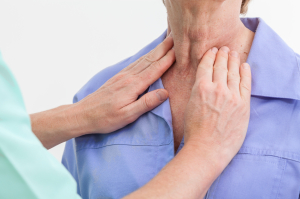As you age, your metabolism tends to slow down, and your risk for low thyroid function goes up. Some degree of hypothyroidism is common in older people. It affects 5-20% of older women and 3-8% of older men. Thyroid Stimulating Hormone (TSH) levels tend to creep up over time, and blood levels of T4 go down. Low thyroid function is associated with increased risk for heart problems and poor memory. Unfortunately, these problems are so common in older people that doctors don’t always make the connection with low thyroid function. Even when mild hypothyroidism is found, doctors don’t always treat subclinical hypothyroidism in older people. Their thinking is that slightly higher TSH level is normal with aging and does not need to be treated.
 I disagree with this way of practice especially when people are having complaints that might be explained by a low temperature (which many older people do). I have found that treating low thyroid function can be very helpful, no matter what your age. I also have found that many people can have low thyroid function even when their TSH level remains within normal range.
I disagree with this way of practice especially when people are having complaints that might be explained by a low temperature (which many older people do). I have found that treating low thyroid function can be very helpful, no matter what your age. I also have found that many people can have low thyroid function even when their TSH level remains within normal range.
So, in addition to TSH, I suggest a simple screening test. Take your body temperature. If it is consistently low, (below 97.8 F. (36.56 C.) chances are good you have slow metabolism, which may be caused by low thyroid hormone activity in your body. (See “How are body temperatures measured” for complete instructions.) You may have trouble converting T4, the inactive form of thyroid hormone, to T3, the active form. This is a problem that is not detected by TSH levels. Low body temperature even with normal TSH levels is a condition called Wilson’s Temperature Syndrome.
WTS can often be corrected with proper thyroid support, which often includes a trial of T3. You can discuss T3 therapy with your doctor and we will be happy to discuss your case with your doctor. Your doctor can call 800.420.5801. The object of T3 therapy is to normalize your oral body temperatures to average 98.6 (37 C.) during treatment.
Older people can often improve a lot with just small amounts of T3, without side effects. They have more energy, think more clearly, are less likely to suffer from depression, and just plain feel better.
REFERENCES
Bensenor IM, Olmos RD, Lotufo PA. Hypothyroidism in the elderly: diagnosis and management. Clin Interv Aging. 2012;7:97-111.
Benseñor IM, Lotufo PA, Menezes PR, et. al. Subclinical hyperthyroidism and dementia: the Sao Paulo Aging & Health Study (SPAH). BMC Public Health. 2010 Jun 1;10:298.
Maselli M, Inelmen EM, Giantin V, et. al. Hypothyroidism in the elderly: diagnostic pitfalls illustrated by a case report. Arch Gerontol Geriatr. 2012 Jul-Aug;55(1):82-4.
Resta F, Triggiani V, Barile G, et. al Subclinical hypothyroidism and cognitive dysfunction in the elderly. Endocr Metab Immune Disord Drug Targets. 2012 Sep;12(3):260-7.

Leave A Comment